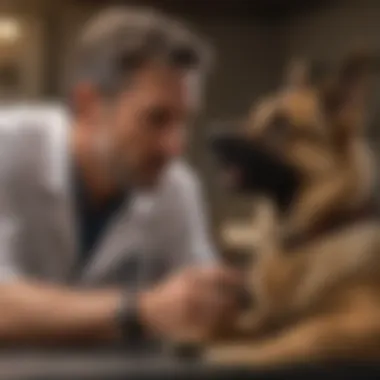Essential Vaccination Guide for German Shepherd Puppies


Intro
Ensuring the health of your German Shepherd puppy is a vital responsibility every pet owner must embrace. Vaccination plays a crucial role in protecting these puppies from preventable diseases and conditions. This guide aims to outline the necessary vaccinations, discuss schedules, and explain the significance of early veterinary care.
Animal Profile
General Overview
German Shepherds are known for their intelligence, loyalty, and versatility. They originate from Germany and have been used for various purposes, including herding, police work, and companionship. Puppies of this breed are particularly prone to certain health issues, making timely vaccinations essential for developing a healthy immune system.
Habitat and Distribution
German Shepherds adapt well to various environments, whether urban or rural. They thrive when they have space to run and play. However, their well-being increasingly depends on human care, supervision, and a structured routine.
Vaccination Importance
Vaccinations are essential at a young age to protect against numerous diseases. Core vaccines include Distemper, Hepatitis, Parvovirus, and Rabies. Additionally, non-core vaccines such as Bordetella and Lyme disease may be recommended based on geographical and lifestyle factors.
Vaccination helps prevent diseases that can severely impact your puppy’s health and quality of life.
Recommended Vaccination Schedule
A comprehensive vaccination schedule for German Shepherd puppies typically follows this timeline:
- 6 to 8 weeks: Begin with the first vaccinations - Distemper, Parvovirus, and Adenovirus.
- 10 to 12 weeks: Second round of vaccinations, including vaccines against Parvovirus and Distemper.
- 14 to 16 weeks: Final doses of core vaccines and Rabies.
- Annual Boosters: Following the puppy vaccinations, annual boosters for core vaccines are necessary to maintain immunity.
Care Tips for Pet Owners
Basic Needs and Requirements
German Shepherd puppies require more than just vaccinations to thrive. Basic needs include:
- Nutrition: High-quality puppy food to support growth and development.
- Exercise: Regular playtime and walks to promote physical health.
- Training: Early socialization and obedience training to foster behavioral stability.
Health and Wellness Tips
Maintaining the health of a German Shepherd puppy involves:
- Regular veterinary check-ups to monitor growth and vaccination status.
- Observing for any signs of health issues, such as lethargy or unusual behavior.
- Providing a safe and stimulating environment for mental and physical engagement.
Preamble to Puppy Vaccinations
Vaccinations represent a cornerstone of preventive health care in puppies, especially for breeds like the German Shepherd. Since these puppies are vulnerable to various diseases, timely vaccinations can significantly reduce the risk of serious illness. Understanding the significance of vaccinations, as well as the diseases they combat, is vital for every dog owner.
Importance of Vaccinations
Vaccinations serve several crucial purposes.
First, they protect puppies from potentially fatal diseases. Diseases such as parvovirus, distemper, and rabies pose significant health threats. Vaccines stimulate the immune system to recognize and fight these diseases, preventing outbreaks of infection.
Second, beyond individual health, vaccinations contribute to community health. A vaccinated puppy is less likely to spread diseases such as kennel cough or distemper to other animals. This forms part of a broader public health strategy, supporting the well-being of both pets and humans in the community.
Finally, vaccinations contribute to long-term health outcomes. Puppies that receive the correct vaccinations are not only healthier in the short term, but they also enjoy a longer life span, allowing owners to spend more time with their companions.
Overview of Common Diseases
It is essential for dog owners to understand the common diseases that vaccinations address. Some of the most prevalent include:
- Canine Parvovirus: A highly contagious virus that leads to severe gastrointestinal distress. It can be fatal if not treated promptly.
- Canine Distemper: A viral disease that affects the respiratory, gastrointestinal, and neurological systems. It is often severe and can be fatal.
- Adenovirus (Canine Hepatitis): This disease affects the liver and can lead to severe illness or death.
- Rabies: A viral disease affecting the nervous system, which is also a critical public health concern.
Understanding the impact of these diseases highlights the necessity for vaccinations. As dog owners, being informed enables the responsible care and protection of our pets.
Core Vaccines for German Shepherd Puppies


Vaccination plays a critical role in the health of German Shepherd puppies. Core vaccines provide essential protection against several highly contagious and potentially life-threatening diseases. Understanding the importance of these vaccines helps ensure responsible pet ownership and promotes the well-being of your puppy.
Canine Parvovirus
Canine Parvovirus is a severe viral disease affecting dogs, particularly young puppies. It is highly contagious and poses a significant risk to German Shepherds. The disease primarily attacks the intestines, leading to severe gastrointestinal issues, dehydration, and, in many cases, death. Vaccination against Parvovirus is vital. The risk of exposure is heightened during socialization, which is common at an early age.
By vaccinating your puppy, you help establish immunity against this dangerous virus. Vaccination is usually given first at six to eight weeks of age, followed by boosters as recommended by your veterinarian. Early vaccination can greatly reduce the chances of infection in a puppy's crucial developmental stage.
Canine Distemper
Canine Distemper is another critical disease requiring vaccination. It is a contagious viral disease that affects multiple systems in a dog's body, including the respiratory, gastrointestinal, and central nervous systems. Symptoms can range from mild respiratory issues to severe neurological problems. Many dogs die from this disease since there is no cure. Therefore, preventing Distemper through vaccination is essential, especially for young puppies.
The initial vaccination is typically given as part of a combination shot, often around six to eight weeks. The timely vaccination will help develop a robust immune response, offering lasting protection. Ensuring your German Shepherd is vaccinated against Distemper is a crucial responsibility.
Adenovirus (Canine Hepatitis)
Adenovirus leads to Canine Hepatitis, which primarily affects the liver. This viral infection can cause severe liver damage and systemic illness. Symptoms range from fever and abdominal pain to jaundice and, in some cases, death. The virus is spread through contact with contaminated urine, feces, or saliva.
Fortunately, vaccination against Adenovirus is effective and is often included in the core vaccine schedule for puppies. The first vaccination typically occurs at a similar time as the other core vaccines. Protecting your German Shepherd from this disease is critical to their long-term health and well-being.
Rabies
Rabies is a viral disease that affects mammals, including dogs and humans. The virus typically spreads through bites from infected animals. Rabies is nearly always fatal once symptoms appear. For this reason, rabies vaccination is legally required in many areas and is crucial for public health.
The rabies vaccine should be administered by the time your puppy reaches 16 weeks of age. Boosters are then usually provided every one to three years, depending on local laws and veterinary guidelines. Ensuring your German Shepherd is vaccinated against rabies protects them and contributes to community health and safety.
In summary, core vaccinations for German Shepherd puppies are fundamental to their health. Each vaccine addresses specific risks, preventing severe diseases that can lead to lasting health issues or even death. It is essential to adhere to the recommended vaccination schedule to ensure optimal health for your puppy.
Non-Core Vaccines to Consider
In addition to core vaccinations, non-core vaccines can also offer protection against diseases that may be region-specific or commonly encountered in certain environments. Understanding non-core vaccines is crucial for German Shepherd owners, as it helps decide the best vaccination strategy for their puppies. While these vaccines are not universally required, they can play a significant role in your puppy's long-term health and wellbeing. The benefits of these vaccines often depend on lifestyle, geographic location, and exposure risk.
Bordetella Bronchiseptica
Bordetella bronchiseptica is a bacterium that primarily causes kennel cough, an infectious respiratory disease among dogs. A Bordetella vaccine is especially important for puppies that may be in contact with other dogs. This is often the case in places like grooming salons, dog parks, or boarding facilities.
Key Benefits:
- Prevention of Kennel Cough: The vaccine reduces the risk of your puppy contracting this contagious illness.
- Reduced Symptoms: Even if exposed, vaccinated puppies tend to experience milder symptoms if they do contract the disease.
This vaccine is often administered as a nasal spray or injection, providing relatively quick immunity. Owners should consider vaccination if their puppy will frequently interact with other dogs.
Lyme Disease
Lyme disease, caused by the bacterium Borrelia burgdorferi, is transmitted through tick bites. For German Shepherd puppies, especially those living in or frequenting wooded areas, this vaccine may be prudent. Symptoms of Lyme disease can manifest in various ways, including fever, joint swelling, and lethargy.
Key Benefits:
- Protection from Tick-Borne Illness: Vaccination can significantly decrease the risk of contracting Lyme disease.
- Minimizing Long-Term Health Issues: Early prevention can avoid more severe consequences that may arise from infection later in life.
Vaccination against Lyme disease is not always necessary for every puppy but should be considered based on lifestyle and environment.
Canine Influenza
Canine influenza is another viral illness that can lead to respiratory issues. This virus spreads through contact with infected dogs or contaminated surfaces. The canine influenza vaccine can be effective for active and social German Shepherds who regularly meet other dogs.
Key Benefits:
- Reduced Outbreak Risk: Vaccination can lower the chances of widespread infection in areas where outbreaks may occur.
- Less Severe Symptoms: Vaccinated dogs display milder symptoms if infected, reducing strain on both the puppy and the owner.
Considering the vaccination against canine influenza can vary, pet owners should consult their veterinarian for tailored recommendations.
Incorporating non-core vaccines into your puppy's health plan is essential not just for their safety but also for the community of dogs they interact with. Prevention is always better than the cure.
Puppy Vaccination Schedule


A well-planned vaccination schedule is vital for the health and well-being of German Shepherd puppies. This temporal framework not only helps protect your puppy from various infectious diseases but also ensures that they receive their vaccinations in a timely manner. Developing a vaccination schedule with your veterinarian establishes a proactive approach to pet healthcare. It becomes the foundation on which your puppy's immunity and overall health are built.
First Vaccination Visit
The first vaccination visit typically occurs when the puppy is around six to eight weeks old. This initial appointment sets the stage for a series of vaccinations that will safeguard your puppy’s future health. During this visit, your veterinarian will administer the first dose of core vaccines, which may include canine parvovirus and canine distemper.
It’s also an opportunity to assess your puppy’s health, administer any necessary deworming medication, and discuss important care guidelines. This visit is crucial because it introduces your puppy to the veterinary environment, easing future vet visits. Here, a strong relationship begins between the puppy and the veterinary staff, which is important for ongoing health care.
Subsequent Vaccinations
Following the first visit, several subsequent vaccinations are needed. Generally, these occur at three-to-four-week intervals until the puppy reaches around 16 weeks of age. Depending on the protocols recommended by your veterinarian, these may include additional core vaccines, such as adenovirus and rabies.
The administration of vaccines in this manner teaches the immune system to recognize and fight off specific infectious agents. Each vaccination visit builds on the previous one, gradually enhancing the puppy’s immunity. It’s essential to adhere to this schedule closely, as delaying or missing vaccinations may leave your puppy vulnerable to serious illnesses.
Booster Shots
Booster shots are an integral part of the vaccination process. They are typically given one year after the initial vaccinations and repeated at regular intervals afterward. These boosters are designed to reinforce the immune response, ensuring your puppy remains protected as they continue to grow.
It is also vital to consider the specific needs of your German Shepherd, as these dogs may have unique health considerations. Regular discussions with your veterinarian will help tailor the vaccination protocol according to your dog’s exposure risk and lifestyle.
Important: Keeping a detailed record of your puppy's vaccination schedule and any health visits aids in maintaining their health over time. This documentation will be invaluable for future veterinary appointments.
Maintaining a proper vaccination schedule is an ongoing commitment. It requires attention and diligence from puppy owners, but the long-term benefits to your dog's health are tremendous.
Potential Risks and Side Effects
Understanding the potential risks and side effects of vaccinations is vital in ensuring the health and safety of your German Shepherd puppy. While vaccines are designed to prevent serious diseases, they can sometimes lead to unintended reactions in some dogs. This section will cover the common reactions typically observed after vaccination and the rare but serious adverse effects that, although infrequent, should be recognized.
Common Vaccine Reactions
Most puppies will experience mild reactions following vaccinations. These are generally short-lived and should not cause alarm. Common reactions include:
- Fever: A slight increase in body temperature can occur, usually returning to normal within a few days.
- Lethargy: Puppies may exhibit decreased energy levels or a reluctance to play during the first few days post-vaccination.
- Soreness at Injection Site: Localized swelling or tenderness may develop at the site where the vaccine was administered.
- Loss of Appetite: Temporary appetite loss can be noted but typically resolves within a day or two.
- Mild Diarrhea: Some puppies may experience soft stools following vaccination, which rarely persists.
These reactions are generally benign and self-limiting, making them an expected part of the vaccination process. It’s crucial for pet owners to monitor their puppies closely during this period and provide supportive care as needed, such as a comfortable resting place and access to fresh water.
It's important to distinguish between normal vaccine reactions and signals of something more serious.
Rare but Serious Reactions
While most puppies will only experience common side effects, there are rare instances of more serious reactions. Although these situations are uncommon, awareness is critical:
- Anaphylaxis: This is a severe allergic reaction that can occur within minutes to hours after vaccination. Symptoms include swelling of the face, hives, vomiting, and difficulty breathing. Anaphylaxis requires immediate emergency treatment.
- Autoimmune Disorders: In rare cases, puppies may develop autoimmune conditions after vaccination. These may manifest as persistent inflammation or other systemic issues. Any unusual health changes should be discussed with a veterinarian.
- Seizures: Some puppies may experience seizures post-vaccination. If this occurs, it is vital to seek veterinary care promptly.
- Tumors at Injection Site: Rarely, fibrosarcomas may develop at the site of injections, especially with certain vaccines. Regular monitoring of vaccine sites is recommended to catch any unusual changes early.
Being informed about these potential serious reactions allows pet owners to make timely decisions in the face of complications. It is advisable to have a trusted veterinary care provider available to discuss these risks ahead of vaccination and to provide guidance on monitoring the puppy’s health afterward.
Understanding both common and rare side effects encourages responsible pet ownership and helps maintain your puppy's health.
Choosing a Veterinary Care Provider
Choosing a veterinary care provider is vital for the overall health of your German Shepherd puppy. This decision involves more than just picking the closest clinic. A qualified veterinarian plays a crucial role in ensuring that your puppy receives the proper vaccinations and healthcare needed for a long and healthy life. It is important to consider various factors that reflect both the qualifications of the veterinary provider and the environment in which your pet will be treated.
Assessing Credentials
When evaluating a veterinarian, the first step is to assess their credentials. Look for a veterinarian who has earned a Doctor of Veterinary Medicine (DVM) degree from an accredited veterinary school. This ensures they have received formal education and training in animal health. Additionally, check if the veterinarian is licensed to practice in your state. Some veterinarians may pursue further certifications in specific fields, such as cardiology or surgery. These additional qualifications can indicate a commitment to professional growth and specialized knowledge.
One valuable resource for verifying veterinary credentials is the American Veterinary Medical Association (AVMA) website. This platform provides information about accredited veterinary schools and licensed practitioners in your area. Finding a veterinarian with a good standing in the community also adds to their credibility. Online reviews against qualifications can also be insightful.
Evaluating Clinic Environment
The clinic environment should be clean, organized, and welcoming. Observe the overall atmosphere when you arrive. Is the waiting area tidy? Do the staff members seem friendly and attentive? Note that a clean and well-maintained facility reflects the provider's commitment to high standards of care.
Additionally, assess how the clinic handles emergencies and regular appointments. Inquire about their hours of operation and whether they offer any emergency services after standard hours. Having a veterinarian that can attend to your puppy at any time can provide peace of mind. The availability of diagnostic tools and technology should also be considered. A modern clinic typically has access to necessary equipment for various medical procedures.
Another important element is whether the clinic has a comfortable area for recovering pets post-treatment. This reflects proper care and concern for animal comfort. Listening to the communication style of the staff can also give insight into the clinic's overall approach to veterinary care.


Financial Considerations
Understanding the financial aspects of veterinary care is essential as well. Inquire about the typical costs of vaccinations, check-ups, and other medical procedures. Some clinics may offer package deals for vaccinations, which can be a cost-effective option for puppy owners. Also, ask about payment plans or financing options, particularly if your puppy may require ongoing treatment for any conditions.
Pet insurance can also be beneficial to offset costs. It is worth researching different insurance plans to find one suitable for your needs. Some providers may recommend insurance plans that align with their services. This information can aid in making an informed financial decision.
Remember: A good relationship with your veterinary clinic can greatly improve the health outcomes for your puppy. It is essential to feel comfortable discussing your concerns and questions with them.
By being thorough in your assessment of a veterinary care provider, you can help ensure your German Shepherd puppy receives the best possible care from the beginning.
Post-Vaccination Care
Post-vaccination care is a crucial aspect of maintaining the health and well-being of German Shepherd puppies following their vaccinations. Ensuring that the puppy is closely monitored can help detect any early signs of side effects. This section outlines key factors in post-vaccination care that pet owners should consider, the benefits of proper monitoring, and the importance of understanding when to seek veterinary assistance.
Monitoring for Side Effects
Once your German Shepherd puppy has received their vaccinations, it is essential to observe them closely for any potential side effects. Most side effects are mild and can include the following:
- Local swelling at the vaccination site
- Slight fever or lethargy
- Decreased appetite for a short period
These reactions generally resolve within a few days on their own. However, it is important to monitor your puppy's behavior and health during this time. Note any lasting symptoms or new symptoms that may appear. Keeping a daily log can assist in tracking their condition and communicating effectively with your veterinarian, if necessary.
The early detection of more serious side effects is vital. Some puppies may experience allergic reactions, which, although rare, can manifest as:
- Difficulty breathing
- Swelling of the face or paws
- Vomiting or diarrhea
If you observe any severe reactions, seeking immediate veterinary care is critical. Remember, being vigilant can help safeguard your puppy's health and ensure timely intervention should it be required.
When to Contact the Vet
Understanding when to reach out to a veterinarian after vaccinations can be a valuable skill for puppy owners. If you notice any of the following situations, it is advisable to contact your vet:
- Persistence of mild side effects beyond two to three days.
- Onset of any severe symptoms like difficulty breathing or swelling.
- Signs of infection or inflammation around the vaccination site, such as excessive redness, heat, or pus.
- Any unusual behavioral changes, such as extreme lethargy, aggression, or disorientation.
Establishing a good communication channel with your vet can enhance your post-vaccination experience. Inquire about their aftercare recommendations and ensure you are aware of their availability for follow-up questions. By fostering an informed partnership with your veterinary care provider, you can make informed decisions about your puppy's health.
A well-informed pet owner plays a vital role in post-vaccination care, helping to prevent complications and ensuring the long-term health of their puppy.
In summary, diligent post-vaccination care aids in catching any side effects early. This attention not only improves recovery outcomes but also contributes to a deeper understanding of your puppy's health needs. Thorough vigilance and effective communication with your vet are key to ensuring a smooth post-vaccination journey.
Long-Term Health Considerations
Maintaining the health of a German Shepherd puppy is an ongoing responsibility that extends beyond the initial vaccination phase. Understanding the long-term health considerations is essential for pet owners. This knowledge helps in ensuring that your puppy grows up to be a strong, healthy dog, capable of living a full life. Regular veterinary care and proper documentation of vaccinations are cornerstone practices that support this goal.
Maintaining Regular Vet Visits
Scheduling regular vet visits is crucial for the long-term health of your puppy. These check-ups allow for monitoring growth and development, as well as early detection of potential health issues. During these visits, your veterinarian can provide vaccinations, assess your puppy's health, and offer guidance on nutrition and behavior.
Benefits of Regular Vet Visits:
- Early Detection: Some health problems can be subtle but become serious over time. Regular assessments help in identifying issues early, allowing for proactive treatment.
- Vaccination Updates: Puppies require several vaccinations over time, as the immunity from initial vaccines wanes. Regular visits ensure that your puppy receives booster shots as needed.
- Comprehensive Care: These appointments also allow for discussions about diet, exercise, dental care, and other health concerns.
In essence, maintaining a routine vet schedule helps keep your German Shepherd puppy in optimal health throughout its life.
Vaccination Records and Documentation
Keeping meticulous vaccination records is an important aspect of puppy health management. This documentation not only provides a history of what vaccines your puppy has received but also serves multiple purposes that can benefit you and your pet.
Reasons for Keeping Vaccination Records:
- Proof of Vaccination: Many boarding facilities, dog parks, and training classes require proof of vaccinations. Having records on hand avoids potential complications when enrolling your dog in these activities.
- Health Tracking: Recording vaccinations contributes to tracking your puppy's health trajectory. It helps identify patterns, such as reactions to specific vaccines.
- Veterinary Reference: If you switch veterinarians or travel, having detailed health records can provide necessary information to new providers. This ensures continuity of care.
Finale
The topic of maintaining your German Shepherd puppy's health through vaccinations is critical for any responsible pet owner. This article underscores the necessity of proper vaccination, covering essential vaccines and recommending schedules. It's important to recognize that vaccinations are not just a series of shots. They play a vital role in safeguarding against various infectious diseases that can severely impact a puppy's health and life.
The Importance of Responsible Pet Ownership
Responsible pet ownership extends beyond providing food and shelter. It encompasses a commitment to ensuring the well-being of a pet through proper health management. Vaccinations are a significant part of this process. They protect not only the puppy but also the community by reducing the risk of disease transmission.
Moreover, pet owners must stay informed about vaccination updates as veterinary practices evolve. Keeping clear records ensures that essential vaccinations are not missed over time. This aspect promotes not just the health of the pet but also fosters trust between the pet owner and their veterinary care provider.















